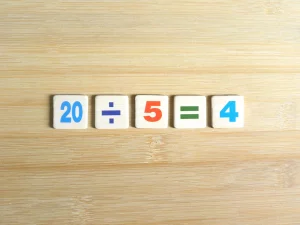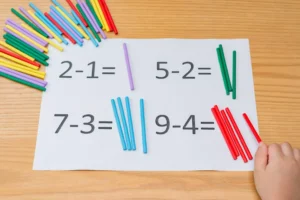If you're watching your child struggle with GCSE maths, you're not alone. Many parents across the UK find themselves worried about their teenager's mathematical progress.
The good news? Recognising the warning signs early means you can take action before exam stress becomes overwhelming.
GCSE maths is a crucial stepping stone for your child's future academic and career prospects. Whether they're aiming for A-levels, apprenticeships, or university, a solid maths grade opens doors. But here's what many parents don't realise: even bright, capable students can hit mathematical roadblocks that require specialised support.
Let's explore the seven key indicators that suggest your child could benefit from personalised maths tuition, and why acting now could make all the difference to their results.
1. Declining Grades Despite Increased Effort
Perhaps the most telling sign is when your child's maths grades start slipping, even though they're putting in more effort than ever before. You might notice them spending hours on homework, yet their test scores continue to disappoint. This frustrating pattern often indicates that they're working hard but not working smart.
When students lack proper understanding of fundamental concepts, they can spend enormous amounts of time on problems without making real progress. A GCSE maths tutor online can quickly identify where these knowledge gaps exist and provide targeted support to fill them efficiently.

The beauty of 1 to 1 maths tuition is that it addresses this exact problem. Rather than your child spinning their wheels on topics they don't fully grasp, a qualified tutor can break down complex concepts into manageable steps, ensuring solid understanding before moving forward.
2. Maths Anxiety and Avoidance Behaviours
Does your child suddenly develop mysterious stomach aches on maths lesson days? Do they make excuses to avoid homework or claim they "just don't have a maths brain"? These avoidance behaviours are red flags that shouldn't be ignored.
Maths anxiety is a real psychological phenomenon that affects many students.
It creates a vicious cycle: anxiety leads to poor performance, which reinforces the belief that they're "bad at maths," which increases anxiety further. Breaking this cycle requires careful, patient intervention.
Online 1-to-1 tutoring provides a safe, judgement-free environment where your child can make mistakes, ask questions, and build confidence gradually. Without the pressure of performing in front of classmates, many students discover they're far more capable than they believed.
3. Struggling With Homework Consistently
If maths homework has become a nightly battle in your household, with tears, frustration, and arguments becoming the norm, this is a clear signal that additional support is needed. When homework regularly takes hours rather than the expected 30-60 minutes, something isn't clicking.
The problem often isn't that your child lacks intelligence or work ethic. Instead, they may be missing crucial foundational knowledge that makes current topics feel impossible. It's like trying to read a book when you're missing every third page.
A best maths tutor online can quickly assess which fundamental concepts need reinforcing, then systematically rebuild your child's mathematical foundation. This approach transforms homework from a source of stress into a confidence-building activity.
4. Inconsistent Performance Across Different Topics
Some students show a puzzling pattern: they excel in certain areas of maths but struggle dramatically with others. Perhaps they're brilliant at statistics but completely lost when it comes to algebra, or they handle geometry well but panic at trigonometry.
This inconsistency often reflects gaps in earlier learning rather than natural ability differences. Mathematical concepts build upon each other like a pyramid. If certain foundational blocks are missing or shaky, everything built on top becomes unstable.
Individual tuition excels at addressing these specific weaknesses whilst reinforcing strengths. Your child's tutor can create a personalised learning plan that targets problem areas without boring them with topics they've already mastered.
5. Teacher Feedback Highlighting Concerns
When your child's maths teacher mentions concerns during parents' evenings or sends notes home about their progress, take this seriously. Teachers see hundreds of students and can spot patterns that indicate when a child needs additional support.
Comments like "struggles to grasp key concepts," "lacks confidence in problem-solving," or "would benefit from extra practice" are diplomatic ways of suggesting that your child needs more individualised attention than classroom teaching can provide.
The advantage of 1 to 1 maths tuition is that it complements rather than replaces school learning. Your child's tutor can work alongside their teacher's curriculum, reinforcing classroom lessons and providing extra practice on challenging topics.
6. Loss of Motivation and Interest in Learning
Has your once-curious child suddenly lost all interest in learning? Do they express hopelessness about their mathematical abilities or claim that "trying doesn't make a difference"? This emotional withdrawal is often more concerning than poor grades themselves.
When students repeatedly experience failure despite genuine effort, they may develop what psychologists call "learned helplessness." They begin to believe that success is beyond their control, leading to reduced effort and further poor performance.
Quality online tutoring can reverse this pattern by providing your child with regular small wins and clear evidence of progress. When students experience success through proper guidance, their motivation and confidence return naturally.
7. Difficulty Applying Knowledge to New Problems
Perhaps your child can follow examples in their textbook perfectly but struggles when faced with slightly different problems. They might understand individual concepts but can't see how to combine them in novel situations. This difficulty with mathematical reasoning and application is increasingly important at GCSE level.
Modern GCSE maths emphasises problem-solving and real-world application rather than just computational skills. Students need to develop mathematical thinking, not just mathematical memory. This requires practice with varied problems and expert guidance in developing strategic thinking approaches.
One-to-one tutoring provides the perfect environment for developing these higher-order thinking skills. Your child's tutor can guide them through diverse problem-solving strategies, helping them become flexible, confident mathematical thinkers.
Why Online 1-to-1 Tuition Works So Well
The benefits of personalised maths support extend far beyond improved grades. When your child works with a dedicated tutor, they receive:
Individualised pacing that matches their learning speed, ensuring they truly understand each concept before progressing. No more feeling left behind or held back by classroom pace.
Immediate feedback and correction that prevents mistakes from becoming ingrained habits. In a classroom setting, errors might go unnoticed for weeks, but a tutor spots and addresses them instantly.
Customised teaching methods that suit your child's learning style. Some students are visual learners, others prefer step-by-step verbal explanations, and many benefit from hands-on activities. A personal tutor adapts their approach accordingly.
Flexible scheduling that works around your family's commitments, sports activities, and other responsibilities. Online tutoring eliminates travel time whilst providing access to the best maths tutors regardless of your location.

The Convenience Factor You'll Love
Let's be honest: as a busy parent, you don't need additional stress in your schedule. Online maths tutoring eliminates the hassle of driving to appointments, waiting in reception areas, and coordinating complex timetables.
Your child can access expert support from the comfort of your home, using familiar technology that engages them naturally. Many parents report that their children are more relaxed and open to learning in their own environment.
Taking Action: What Happens Next?
If you've recognised several of these signs in your child, the next step is simple: explore your tutoring options sooner rather than later. Early intervention is always more effective than last-minute panic revision.
When evaluating potential tutors, look for qualified professionals with specific GCSE experience who can demonstrate a track record of helping students achieve their target grades. The right tutor will conduct an initial assessment to identify your child's specific needs and create a tailored learning plan.
Remember, seeking additional support isn't an admission of failure; it's a proactive investment in your child's future success. Many of the UK's most successful students have benefited from targeted tuition at crucial moments in their academic journey.
Your child's mathematical confidence and GCSE results can improve dramatically with the right support. The question isn't whether they need help, but rather how quickly you can provide it. Every week of quality tuition builds stronger foundations for exam success and future learning.
The path to GCSE maths success might feel challenging right now, but with expert guidance and your continued support, your child can absolutely achieve their goals and develop genuine confidence in their mathematical abilities.












